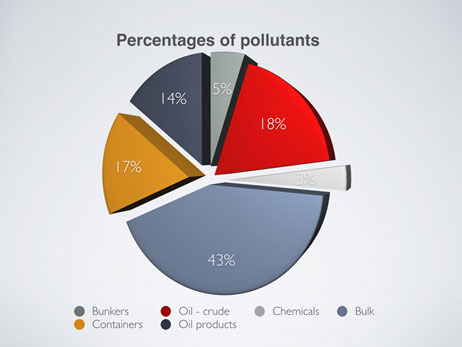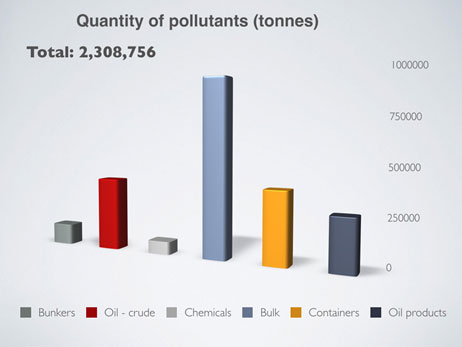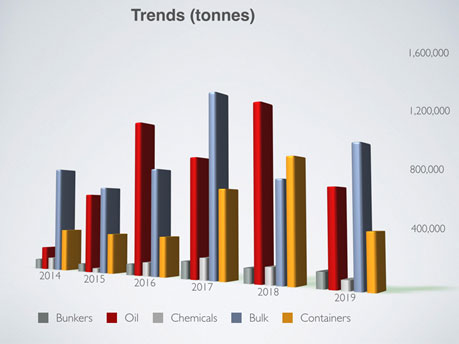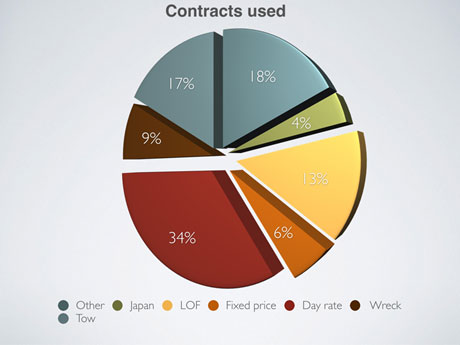Members of the International Salvage Union (ISU) provided 214 services to vessels carrying 2,308,756 tonnes of potentially polluting cargo and fuel during operations in 2019 demonstrating the importance of ISU members’ role in protecting the marine environment. The data come from the results of the ISU’s Annual Pollution Prevention Survey for operations in 2019.
The 2019 figures show a decrease from 2018’s total of 3.2 million tonnes. The decrease is accounted for by the 2018 numbers having an unusually large amount of crude oil. One or two VLCC cases can have a significant impact on the overall numbers. Crude oil in 2019 was 400,000 tonnes the equivalent in 2018 was 978,000 tonnes.
Cargoes of refined oil products also fell in 2019 to 278,046 compared with 324,988 in 2019. The number of containers involved in ISU members’ services in 2019 was also down to 25,799 TEU, the 2018 figure was 59,874 TEU. The number of containers in cases in 2019 equates to 386,985 tonnes (allowing a nominal 15 tonnes per TEU).
Bulk cargoes increased to 961,061 tonnes in 2019. This category includes products such as coal, scrap steel, grains, soya and cement. A number of bulk cargoes are not included as potential pollutants and ISU members also provided services to bulkers carrying 229,731 tonnes of non-hazardous dry bulk – mainly metal ores.
Bunker fuel, remains remarkably consistent at 115,811 tonnes compared with 111,796 tonnes the previous year. A number of services noted within the total did not record the quantity of bunkers on the vessel or the cargo type.
Commenting on the results of the survey, President of the ISU, Richard Janssen, said: “ISU members deliver services that save life and property but, as the results of this survey show so clearly, our members’ operations also protect the environment from great harm. The numbers, when compared with other years, also show the variability of our industry.
“We are always transparent with these numbers – we know that not all of these potential pollutants were at risk of going into the sea. Some cases will have had limited danger but many others will have carried a real risk of substantial environmental damage.
“Attitudes to the natural world have changed dramatically in recent years and the environment is now at the centre of political and business decision making. It is essential that there continues to be global provision of expert salvage services to respond to maritime emergencies and, in most cases, it is only the professional salvors – members of the ISU – who have the experience and equipment to make those interventions and prevent environmental catastrophes.”
2019 ISU Pollution Prevention Survey Results (tonnes)
| 2019 | 2018 | |
| Number of services | 214 | 224 |
| Bunker fuel | 115,811 | 111,796 |
| Crude oil | 400,000 | 978,000 |
| Refined oil products | 278,046 | 324,988 |
| Chemicals | 70,944 | 127,885 |
| Bulk polluting/hazardous | 961,061 | 743,100 |
| TEU – tonnes equivalent | 386,985 (25,799 TEU@nominal 15 tonnes/TEU) | 898,110 (59,874 TEU@nominal 15 tonnes/TEU) |
| Other pollutants | 95,909 | 29,349 |
| Totals | 2,308,756 | 3,213,228 |
Of the 214 services provided by ISU members in 2019, variants of wreck removal contracts were used in 19 services; Lloyd’s Open Form – 28 services (in total, 29 LOFs were reported to Lloyd’s in 2019). Towage contracts accounted for 36 services; Japanese Form – 8 services; Fixed Price and Lump Sum – 12 services; Day Rate – 73 services and other contracts were used in 31 services. The Turkish Form was used in 7 services.
The survey was first conducted by ISU in 1994 and the methodology was updated in 2014 to include a wider range of potential pollutants including containers and hazardous and dirty bulk cargoes. It now recognises that coastal state authorities consider most cargoes to be potentially polluting. Container trade has also increased dramatically and the capacity of containerships is now far greater than in 1994. Containers, with mixed and sometimes hazardous contents – and the danger they cause if left in the sea – are both a potential pollutant and hazard.
The survey takes account of the International Convention on the Prevention of Pollution from Ships (MARPOL), the International Maritime Dangerous Goods Code (IMDG Code), Intercargo guidance, P&I Club guidance; International Tanker Owners’ Pollution Federation publications and the International Solid Bulk Cargoes Code.
In the period 1994 to end-2019, ISU members have provided services to casualty vessels carrying 33,728,360 tonnes of potential pollutants, an average of more than one million tonnes per year.
Graphics: ISU Pollution Prevention Survey 2019




